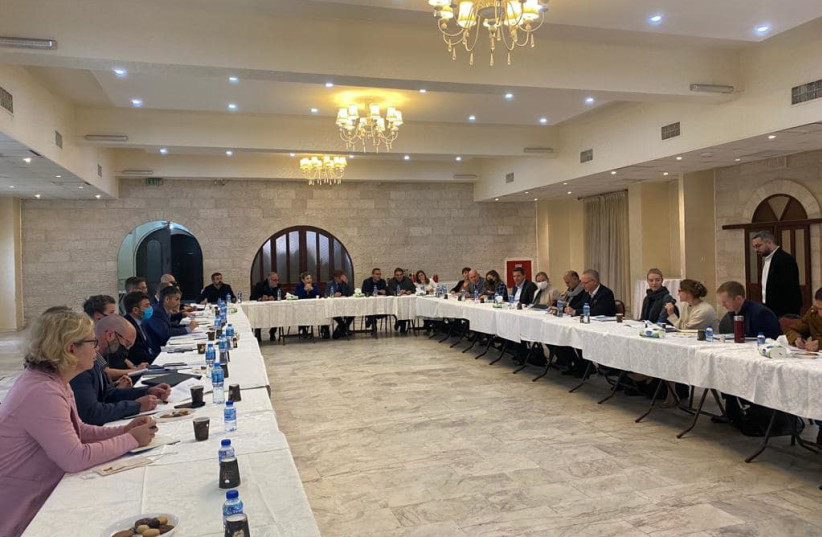Two pending agreements between Israel and the European Union could face obstacles to their completion in the incoming government because of Brussels’ requirement that they exclude Judea, Samaria, east Jerusalem and the Golan Heights.
Currently on the table are an intelligence-sharing agreement between the Israel Police and Europol, and Creative Europe, which provides grants to cultural projects and institutions.
Both agreements were put on hold in September, weeks before the November 1 election, for reasons not having to do with the incoming government.
However, in both cases, the challenges to their completion have to do with their “territorial clause.” With the expected coalition set to be significantly more right wing than the current one, and many of its members, including likely ministers, having opposed such clauses in the past, the disagreements are likely to be even more intractable.
Will a new government help with diplomacy?
As one diplomatic source in Jerusalem put it, “We don’t think the new government can solve the problem. It’s connected to the Green Line. If the departing government couldn’t solve it, this one probably can’t either.”

The territorial clause in major EU agreements had been controversial in Jerusalem for the past decade when then-ministers Naftali Bennett and Ze’ev Elkin, among others, initially refused to support Horizon 2020, which would provide major funding for scientific research and development. The eventual compromise was that the term would be an appendix to the EU’s side of the deal. However, Israel would not sign that part. In addition, the government provided its own grants for research in the areas in question.
Israeli and European negotiators reached a provisional agreement on a draft text on exchanging personal data between the Israel Police and Europol in September 2022, after 10 months of negotiations.
The European Commission negotiator brought the draft to the European Council, ahead of final approval in Brussels, and several member states raised concerns about exceptions to the usual geographical limitations in the agreement.
The draft states that the agreement would only apply to pre-1967 Israel, but it also allows use of personal data in territories that came under Israel’s control in 1967 under specific circumstances and conditions, in order to protect civilian life.
Some member states opposed even that narrow allowance, and the European negotiator planned to reopen discussions on the matter, to try to find alternative solutions.
Creative Europe was brought before Israel’s cabinet in late September. The program’s budget is €2 billion; Israel was meant to contribute NIS 33 million (€9.6m.), and the Culture and Sport Ministry expected Israelis would get far more than that in grants.
However, some on the Right raised concerns that the agreement would lead artists to boycott Judea, Samaria, east Jerusalem and the Golan Heights, and the Kohelet Policy Forum said it would petition the High Court of Justice if the government signed on to the agreement.
Jerusalem Deputy Mayor Fleur Hassan-Nahoum said at the time that “based on the terminology of the EU’s discriminatory instructions, artists who receive grants or prizes will be prevented from appearing in the Old City [of Jerusalem and the Jerusalem neighborhoods] Pisgat Ze’ev or Har Homa. This is too high a price for strengthening ties between Israel and Europe.”
The Culture and Sport Ministry argued that “the agreement does not prevent cultural institutions or artists who receive grants from the program from being active in Judea and Samaria and the Golan Heights as long as it is not funded in the framework of the program.”
That being said, the agreement stipulated that if an institution receives a grant, it would not be able to perform or exhibit over the Green Line for the duration of the funding.
“Based on the terminology of the EU’s discriminatory instructions, artists who receive grants or prizes will be prevented from appearing in the Old City [of Jerusalem and the Jerusalem neighborhoods], Pisgat Ze’ev or Har Homa. This is too high a price for strengthening ties between Israel and Europe.”
Fleur Hassan-Nahoum, Jerusalem Deputy Mayor
Bennett, alternate prime minister at the time, used his veto power to stop Israel from joining Creative Europe, saying that an interim government should not make unnecessary controversial moves.
Asked about the new agreements specifically, and whether they oppose territorial clauses more broadly, the offices of both presumptive finance minister Bezalel Smotrich and likely national security minister Itamar Ben-Gvir – who will have authority over the police – said they are not familiar with the subject and need to learn more before commenting.
However, both signed a letter opposing the Creative Europe agreement in September, on grounds of it excluding Judea, Samaria, east Jerusalem and the Golan Heights.
Religious Zionist Party MK Orit Struck, who is expected to be a cabinet minister, spearheaded the letter with Likud MK Yoav Kisch as chairs of the Land of Israel Caucus. About 30 of the letter’s signatories are members of the expected coalition.
“Not only do I have an opposition [to the territorial clause], many members of the future coalition do,” Struck said.
The European Parliament Subcommittee on Human Rights is expected to vote on Wednesday on a resolution “on the prospects for the two-state solution for Israel and Palestine,” which a source who has seen the draft said features the most critical language of Israel that she had seen in a decade.
An aide to Subcommittee on Human Rights chairwoman Maria Arena, who is behind the resolution, was arrested in connection to a corruption scandal in the Socialists and Democrats group in the European Parliament involving illegal lobbying for Qatar.
